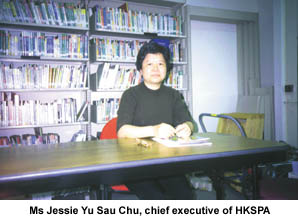Social Issues |
Home | Archives | About | Media Links

October 1999
Economy
Update -
NGOs
Bear Brunt of Economic Downturn
By Michele Tang
See also:
NGOs Suffer from Public Policy
Another
article from this beat:
Matching Services - Shooting Arrows on
Cupid's Behalf
Small non-governmental organisations encountered severe financial difficulties this year.
They do not have sufficient subsidies to meet the increasing demand for their social services.
The subsides declined this year because of the recent economic downturn.
To solve the problem, small NGOs are trying to acquire more resources and cut down expenses.
The Pneumoconiosis Mutual Aid Association and the Hong Kong Single Parents Association are two examples of small NGOs in Hong Kong.
The demand for these NGOs is increasing. For instance, each year, there are more than 100 new cases of pneumoconiosis, a kind of lung disease.
Unfortunately, subsidies to the NGO have not increased accordingly.
Said Ms Iu Pui Yuk, service coordinator of the PMAA: "We are facing unstable subsidies, and it is difficult to run our organisation.
"We rely on donations from enthusiastic people and charity funds such as the Hong Kong Jockey Club and The Community Chest of Hong Kong," continued she.
However, owing to the economic downturn starting in 1997, donations to charity funds declined.
Ms Iu said, "As charity funds raised less money last year, more NGOs applied for the funds, which makes it more difficult for NGOs to get subsidies from the funds."
The Hong Kong Jockey Club stopped subsidizing the PMAA in March, and support from The Community Chest of Hong Kong declined as well.
This made the PMAA lose about $400,000 this year.
Other factors varying the amount of funding for NGOs year after year are donor behaviours and the occurrence natural disasters.
Ms Jessie Yu Sau Chu, chief executive of the HKSPA, said, "People do not donate money to a fixed NGO. They may donate money to NGOs concentrating on the elderly this year and single parents next year.
"Catastrophes such as the flooding in China last year made people donate money to sufferers in China. This means that less money was donated to Hong Kong NGOs," she continued.
Apart from unstable subsidies, the NGOs have encountered an increase in recurrent expenditures.
Of all expenses, rent is the major burden for the NGOs. In April 1998 the Housing Department increased some rents by 33 percent. Said the HKSPA Ms Yu: "The rent for about 170 square meters is $8,800 per month now. Therefore we have to pay about $100,000 for rent a year.
"But it is difficult for small NGOs such as our organisation to raise such a large sum of money to cover expenses," Ms Yu added.
Owing to potential financial deficits, the NGOs are trying to solve the problem by exploring more funding resources.
It seems to be a good solution. However, there is a disadvantage.
Ms Yu said, "Staff in the NGOs have to pay more effort to raising funds rather than organising activities for their clients, which is the staff’s job.
"It is a waste of human resources," she said.
Ms Iu of the PMAA said this increased the workload of the staff.
In addition to exploring resources, the NGOs have had to reduce expenses through cutting down the number of staff and the service provided, which the NGOs are reluctant to do.
Ms Iu said, "Originally, there were three colleagues. As the subsidies were not enough to pay their salaries, we unwillingly dismissed one colleague.
"In the worst case, only one colleague will remain to do the routine work," Ms Iu added.
Said Ms Yu: "Reducing the number of the staff will lower their morale since they are afraid of becoming unemployed and not getting their salaries."
Also, because of inadequate funding and human resources, the NGOs cannot carry out some of their plans and are providing less service.
Said Ms Yu: "We want to provide direct and intensive service such as a face-to-face counselling service, but we cannot do so because of scarce resources."
Ms Iu of the PMAA said, "Regular visits to some serious pneumoconiosis patients, for example, will be less frequent because of a shortage of manpower."
However, the major consequence of insufficient subsidies is the hindrance of the NGOs' development.
Said Ms Yu: "We can only provide services to those who have an emergency. But there is no follow-up service for them.
"Moreover, we can only achieve short-term goals. Multiple-stage plans cannot be implemented.
"As a result, we cannot help single parents to solve all problems they face at different stages," said she.
Also the quality of service provided cannot be enhanced due to the absence of long-term planning, according to Ms Yu.
Both the PMAA and the HKSPA hope that the government can do something to help them to overcome these difficulties.
Said Ms Iu of the PMAA: "The government should provide more resources and manpower so that we can provide more services and organise more activities for clients."
Ms Yu of the HKSPA said, "Government departments should coordinate to help the NGOs.
"For example, recent subsidies offered by the Social Welfare Department can be directly transferred to the Housing Department.
"This can save time and administration costs for all parties involved," said Ms Yu.
Relaxing requirements on rent subsidies and exempting non-profit NGOs from paying rent in Housing Department's areas are preferred.
Said Ms Yu: "To apply for a rent subsidy, the NGO should not have a surplus of more than $100,000 annually.
"But his $100,000 would only cover expenses of our organisation for one month."
Home | Archives | About | Media Links